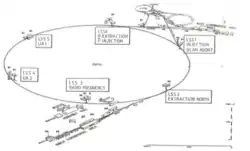UA8 experiment
UA8 experiment was a high-energy physics experiment at the Proton-Antiproton Collider at CERN. The proposal for the experiment was done by physicists at the University of California, and it was approved in April 1985. Its spokesperson was Peter Schlein.
 | |
| Key SppS Experiments | |
|---|---|
| UA1 | Underground Area 1 |
| UA2 | Underground Area 2 |
| UA4 | Underground Area 4 |
| UA5 | Underground Area 5 |
| SppS pre-accelerators | |
| PS | Proton Synchrotron |
| AA | Antiproton Accumulator |
The aim of the experiment was to search for and study jets in high mass collisions at 630 GeV center-of-mass energy, in order to elucidate the nature of the pomeron and its possible particle structure. [1]
The measurement were done in collaboration with the UA2 experiment, and triggered on a minimum transverse energy in the UA2 calorimeter system and a diffractive recoil proton signature in a system of Roman pot wire chambers. UA8 was placed at the same interaction point as the UA2 experiment, and was designed in such a way that it could record data in parallel with UA2.[2]
UA8 was the first time a Roman pot was used to trigger a central collider experiment. A very clean signal for jets in diffractive dissociation was observed after the first year of data-taking, and so the new field of "hard diffraction" was born.[3]
References
- Bonino; et al. (26 October 1984). "Proposal to SPSC: Study of Jet Structure in High Mass Diffraction at the SPS Collider" (PDF). Nuclear Physics B. 519: 3–18. Retrieved 19 July 2017.
- Chèze; et al. (11 December 1997). "Measurements of Inclusive Λ0 Production with Large xF at the SppbarS Collider" (PDF). Retrieved 19 July 2017.
{{cite journal}}: Cite journal requires|journal=(help) - Erhan, Samim; Saltzberg, David; Wallney, Rainer (19 August 2008). "Obituaries, Peter Schlein". CERN Courier. CERN. Retrieved 19 July 2017.